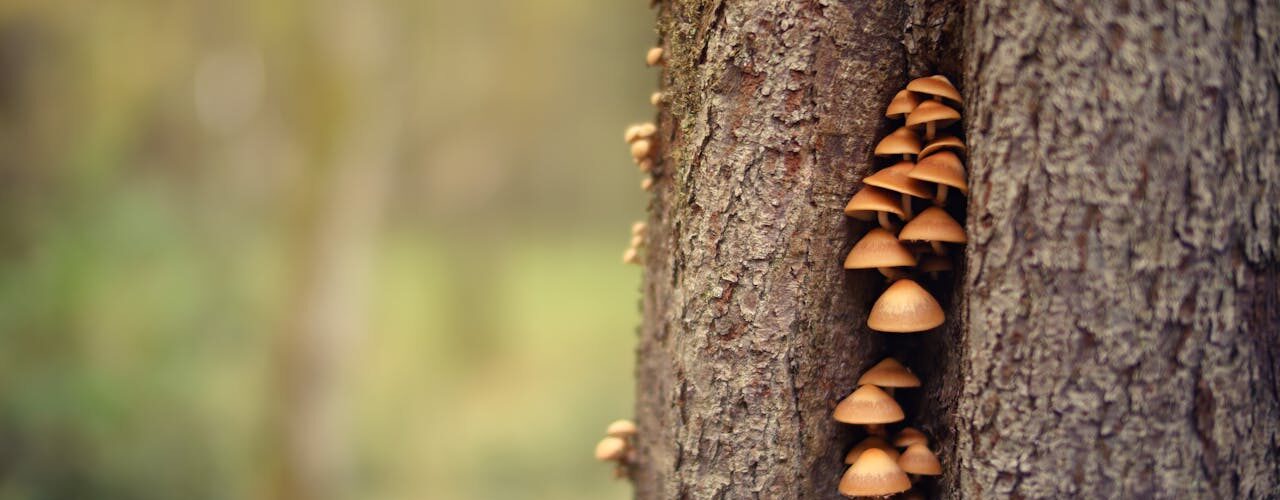When we say fungus, what do you think of? Dirty, dingy, damp, disease?
Well, that is what later narratives have led us to believe. We Indians have known mushrooms since the Vedas. In fact, all the ancient civilizations, be it the Chinese or Mayans, have admired the marvels of mushrooms.
With rising awareness, mushrooms are ready to take center stage again.
Stay with us to discover how these same species are being used to cure diseases and fight climate change with the latest scientific advances.
Fungi are a family of organisms, just like plants and animals. Mushrooms are the best-known fungi.
As it turns out, humans share more similarities with mushrooms than meets the eye. With their ability to respond to environmental cues, seek sustenance, and defend themselves, mushrooms exhibit a form of intelligence that highlights their pivotal role in nature.
Spanning a staggering 1.5 million species, fungi reign as the oldest and largest organisms on Earth, showcasing a diversity that surpasses even plants.
Mushrooms as Food
In the new world, mushrooms have emerged as a powerful and promising player. The meat industry is a major polluter as it releases greenhouse gases like methane and carbon dioxide and has high water consumption. With the rise in eco-consciousness, people are looking for meat alternatives.
The rising vegan population finds mushrooms the best replacement for a protein-rich diet. Packed with nutrients like vitamin B, vitamin D, Selenium, Ergothioneine, and potassium, mushrooms are being called a superfood.
While button mushrooms and oyster mushrooms are the most common mushrooms used in cooking, other mushrooms have been found to have medicinal properties.
It is worth mentioning that the Guchhi Mushrooms of the Himalayas are the world’s most expensive mushrooms. In 2022, a GI tag was given to the Gucchi mushrooms of Jammu and Kashmir for their unique taste and health value.
Mushrooms as Medicine
Modern medicine sees a promising potential in mushrooms.
Turkey tail mushrooms have been effective in aiding the healing of cancer. Still under research, Psilocybin, found in magic mushrooms, has shown promising results in alleviating anxiety and depression with just a single dose.
We find mentions of mushrooms in traditional methods of wellness, too. Ganoderma mushrooms, known as Reishi in Japanese and Lingzhi in Chinese, are celebrated for their potential health benefits. Agarikon mushrooms, also called the “elixir of long life” by Greeks, boost the immune system and aid in pulmonary diseases.
Mushrooms as Lifeline of Forest
It is not just humans that benefit from the curative properties of mushrooms. It helps the forests, too, to stay healthy and lush.
Fungi have root-like structures called mycelium. Nature communicates through these mycelium networks just how information travels in the neural network in our brain through the exchange of electrolytes. Research has shown how trees recognize their seedlings and help them in nourishment and combating natural dangers. Trees also warn against disease or insect attack and swap nutrients through these networks to other trees, hence helping combat local droughts. And at the end of a tree’s life, it helps it assimilate back to nature.
Often dubbed the “digestive tracts of forests,” mushrooms play a vital role in rejuvenating and recycling natural resources, embodying the essence of sustainable living. Beyond their culinary appeal and healing superpowers, mushrooms are key to unlocking a greener, more sustainable future.
From their remarkable intelligence to their unparalleled adaptability, mushrooms offer a plethora of solutions to combat climate change and foster environmental stewardship. We tried to discover how mushrooms are reshaping our understanding of sustainability.
Mushrooms and Climate Change Mitigation
Amidst the looming specter of climate change, mushrooms emerge as unlikely heroes in the fight against environmental degradation. Beyond their nutraceutical value, mushrooms exhibit a remarkable capacity to absorb carbon and break down toxins, including plastic and oil.
Under the Radical Mycology Project, Peter McCoy has trained the Pearl Oyster mushroom to digest used cigarette filters. Through innovative applications such as biopesticides, carbon offsetting, and remediation of oil spills, mushrooms offer tangible solutions to mitigate pollution and restore ecological balance. Moreover, their symbiotic relationship with forests serves as a natural carbon sink, further highlighting their role as guardians of the planet.
Harnessing Mushroom Power for a Sustainable Future
From sustainable construction materials to biodegradable packaging and renewable energy solutions, mushrooms are revolutionizing diverse industries.
Innovators like Peter McCoy are spearheading groundbreaking research to harness the potential of fungi in addressing pressing environmental challenges. Whether it’s filtering water, aiding bee health, or fabricating compostable materials, mushrooms epitomize nature’s ingenuity and resilience. Possibilities are limitless, and India is not to be left out of the conversation.
Innovators like Chaitanya Dubey of Kinoko Biotech and Arpit Dhupar of Dharaksha have come up with biomaterials using mushrooms that can eventually replace thermocol as a packaging material at the commercial level.
As we embrace the paradigm shift towards a more sustainable future, mushrooms serve as beacons of hope and inspiration, reminding us that collective action and symbiotic relationships are the keys to survival in an ever-changing world.
Wrapping up
In a world grappling with the repercussions of climate change, mushrooms offer a ray of hope and a blueprint for sustainable living. From their ancient wisdom to their modern applications, fungi exemplify the power of nature to heal, innovate, and thrive.
As we navigate the challenges ahead, let us heed the lessons of mushrooms and cultivate a deeper appreciation for the interconnectedness of all life on Earth. Together, we can harness the transformative potential of mushrooms and pave the way toward a brighter, more resilient future for generations to come.
The article is contributed by Ankit Sahu.






Add comment